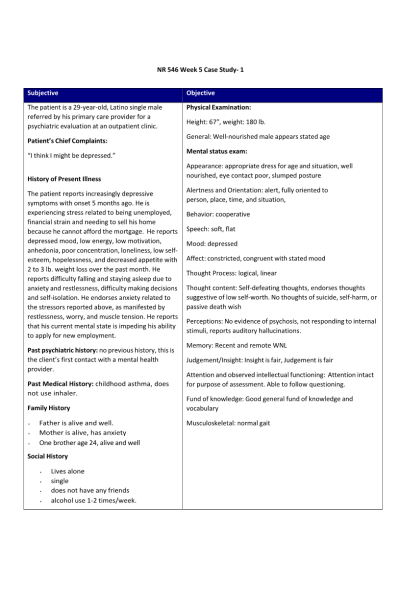NR 546 Week 5 Case Study: The client is a 29-year-old, Latino single male
-
$25.00
| Institution | NR 546 Advanced Pharmacology: Psychopharmacology for Psychiatric Mental Health Nurse Practitioner |
| Contributor | LaToya |
|
Subjective |
Objective |
|
The client
is a 29-year-old, Latino single
male referred by his
primary care provider for a psychiatric evaluation at an outpatient clinic. Client’s Chief Complaints: “I think I might
be depressed.” History of Present Illness The
client reports increasingly depressive symptoms
with onset 3 months ago. He is experiencing
stress related to being unemployed, financial
strain and needing to sell his home quickly
because he cannot afford the mortgage. He reports depressed mood, low energy, low
motivation, anhedonia, poor
concentration, loneliness, low self- esteem, hopelessness, and decreased appetite with 12 lb. weight loss over the past
month. He reports difficulty
falling and staying asleep due to anxiety and
restlessness, difficulty making decisions and self-isolation. He endorses anxiety related to the stressors reported above, as manifested
by restlessness, worry, and muscle
tension. He reports that his
current mental state is impeding his ability
to apply for new employment and prepare his home for the
impending sale. Past psychiatric history: no previous history, this is the client’s first contact with a
mental health provider. Past Medical History: childhood asthma, does
not use inhaler. Family History •
Father is alive and well. •
Mother is alive, has anxiety “all her life” •
One brother aged 24, alive and well Social History •
Lives alone •
single •
does not have any
friends |
Physical Examination: Height: 67″,
weight: 200 lb. General: Well-nourished male appears stated
age Mental status exam: Appearance: appropriate dress for age and situation, well nourished, eye contact poor,
slumped posture Alertness and Orientation: alert,
fully oriented to person‚ place‚
time‚ and situation, Behavior: cooperative Speech: soft, flat Mood:
depressed Affect: constricted, congruent with stated
mood Thought Process: logical‚ linear Thought content:
Self-defeating thoughts, endorses thoughts
suggestive of low self-worth. No thoughts of suicide‚ self-harm‚ or passive death
wish Perceptions: No evidence of psychosis, not responding to internal stimuli, reports auditory
hallucinations. Memory:
Recent and remote WNL Judgement/Insight: Insight is fair, Judgement is fair Attention and
observed intellectual functioning: Attention intact for
purpose of assessment. Able to follow
questioning. Fund of knowledge: Good general fund
of knowledge and
vocabulary Musculoskeletal: normal
gait |
|
•
alcohol use
1-2 times/week. •
no marijuana or illicit drug
use •
attended one year of college. Trauma
history: Client reports was
bullied in middle school
due to difficulty learning English. No nightmares or flashbacks. Review of Systems • appetite diminished, weight
loss 12 lbs. • sleeps 5-6 hours
at night, difficulty falling asleep with frequent night waking. • No headache • No palpitations, tremors Allergies: NKDA, allergic to grass, perennial trees, dust mites,
and cockroaches. |
|
Primary diagnosis: Major Depressive Disorder, single episode, moderate
with anxious distress
(F32.1)
A.
Select one drug to treat the diagnosis(es) or symptoms.
B.
List medication class and mechanism
of action for the chosen medication.
C.
Write the prescription in prescription format.
D.
Provide an
evidence-based rationale for the selected medication using at least one scholarly
reference. Textbooks may be used for additional references but are not the primary
reference.
E.
List any side effects
or adverse effects
associated with the medication.
F.
Include any required
diagnostic testing. State the time frame for this testing (testing is before medication initiation or q 3 months,
etc.). Includes normal
results range for any listed laboratory tests.
G.
Provide a minimum of three appropriate medication-related teaching points
for the client and/or family.
Instructor question response:
Thanks for
posting your week 5 case study discussion. Please
discuss your rationale and evidence for using adjunctive benzodiazepines for the anxiety.
| Instituition / Term | |
| Term | Year 2022 |
| Institution | NR 546 Advanced Pharmacology: Psychopharmacology for Psychiatric Mental Health Nurse Practitioner |
| Contributor | LaToya |



































